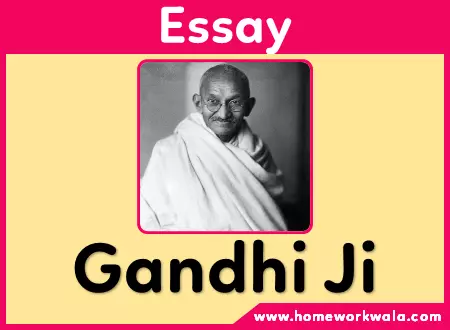Today, In this article we are going to write essay on Gandhiji in English in 500 words. This article is about Gandhiji.
This post can help the school students who are looking “Gandhiji par nibandh English mein”. We briefing about “Gandhiji in the English” which is very useful for student.
This essay on “Gandhiji” is generally useful for class 7, class 8, class 9 and 10.
[ad1]Table of Content

Simple essay on Gandhiji in English
Introduction
Mahatma Gandhi, an iconic figure in India’s history, was a visionary leader who played a significant role in the country’s struggle for independence. Millions around the globe still draw inspiration from his life and teachings. In this essay, we will explore the various aspects of Gandhi’s life and his philosophy of nonviolent resistance.
[ad2]
Early Life and Education
Gandhi was born into a devout Hindu family in Porbandar, Gujarat, in 1869. His upbringing was influenced by the religious and cultural values of his community. Gandhi’s education began in Rajkot and continued in England, where he studied law. These formative years shaped his character and instilled in him a sense of justice and compassion.
[ad3]
Lawyer and Activist
After completing his law studies, Gandhi moved to South Africa, where he experienced firsthand the discrimination faced by Indians. This pivotal moment marked a significant turning point in his life’s journey. As a lawyer, he fought against the unjust treatment of Indians and founded the concept of Satyagraha, or nonviolent resistance, as a powerful tool for social and political change.
Struggle for Indian Independence
Returning to India, Gandhi joined the Indian National Congress and became actively involved in the fight against British colonial rule. He led numerous movements and campaigns, advocating for nonviolent methods and civil disobedience. The Salt March, where Gandhi and his followers marched to the sea to protest against the British salt tax, became a defining moment in India’s struggle for independence.
Principles of Nonviolence
At the core of Gandhi’s philosophy was the principle of nonviolence, or ahimsa. He believed that nonviolence could bring about personal and societal transformation, and it became the cornerstone of his approach to activism. Gandhi taught that nonviolence required courage, self-discipline, and a deep understanding of the power of love and compassion.
Social and Economic Reforms
Gandhi was deeply committed to social justice and equality. He fought against untouchability and caste discrimination, advocating for the upliftment of marginalized communities. He promoted self-reliance and rural development, emphasizing the importance of sustainable and community-based economies. Gandhi criticized industrialization and materialism, believing that true progress lay in simplicity and self-sufficiency.
Legacy and Impact
Gandhi’s influence extended far beyond India’s borders. His philosophy of nonviolence inspired civil rights movements around the world, including leaders like Martin Luther King Jr. and Nelson Mandela. Gandhi’s principles of peacebuilding and conflict resolution continue to shape global conversations on justice and human rights.
Criticism and Controversies
While Gandhi is widely revered, his beliefs and actions have faced criticism and controversies. Some question his views on gender equality and his stance on caste discrimination. Additionally, there have been debates about his positions on violence and nationalism. These discussions invite a deeper understanding of Gandhi’s complexities and provide an opportunity for critical analysis.
Conclusion
Mahatma Gandhi’s life and teachings remain a beacon of hope and inspiration. His unwavering commitment to nonviolence, social justice, and equality continues to resonate in the modern world. By studying and embracing Gandhi’s principles, we can strive towards building a more just and peaceful society for all.
[ad4]
You May Also Like
FAQ
Q. Who was Mahatma Gandhi?
Ans: Mahatma Gandhi was a visionary leader and symbol of nonviolent resistance in India’s struggle for independence.
Q. What were Gandhi’s early influences?
Ans: Gandhi’s early influences were his religious and cultural upbringing, as well as his education in law.
Q. What was Gandhi’s philosophy?
Ans: Gandhi’s philosophy revolved around nonviolence (ahimsa) and the transformative power of love and compassion.
Q. What role did Gandhi play in India’s independence movement?
Ans: Gandhi played a crucial role in leading various movements and campaigns against British colonial rule.
Q. What were some of Gandhi’s social and economic reforms?
Ans: Gandhi advocated for the upliftment of marginalized communities, fought against untouchability and caste discrimination, and promoted self-reliance and rural development.
Q. What was Gandhi’s impact on the world?
Ans: Gandhi’s teachings of nonviolence inspired civil rights movements globally, influencing leaders like Martin Luther King Jr. and Nelson Mandela.
Q. What criticisms surround Gandhi?
Ans: Gandhi faced criticism regarding his views on gender equality, caste discrimination, violence, and nationalism.
Q. What is Gandhi’s legacy today?
Ans: Gandhi’s legacy lies in his enduring principles of nonviolence, social justice, and equality, which continue to guide movements for peace and justice worldwide.
We hope you like this post about essay on Gandhiji in English. We are very glad to help the students to do their homework in an effective way. This was a “Gandhiji ka essay English mein”. This type of questions generally asked the students in their schools to write essay on Gandhiji.